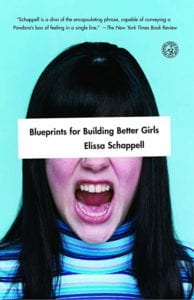
Shelf Unbound:As the writer of the “Hot Type” book column for Vanity Fair, cofounder of Tin House magazine, and former senior editor of The Paris Review, you’ve probably read as much contemporary fiction as anyone. So with Blueprints for Building Better Girls, was there a particular literary territory you wanted to stake out as your own?
Elissa Schappell: Since the time I was a little girl, writing has been the one thing I have always done and it is the only thing I have ever been good at. Growing up I very much wanted to please my parents—who were good parents—and be a good daughter. And certainly in the culture I was growing up in, girls were supposed to be nice. But I was a depressed kid from about the time I was 10, and nobody wanted to hear about that. So I would actually write swear words in water on the wall of my closet. I would write “fuck” there and in the pages of my diary. I wrote terrible poetry and terrible limericks. Writing was the one place where I could unload my anger.
When I was an editor at The Paris Review, there was constantly brilliant stuff in front of me. “Wow, we have another story by Alice Munro!” We published the beginning of The Virgin Suicides. I was constantly thinking, Why do I even try? This is crazy. But you also see that good writers write bad stories, and I discovered that if I typed one of Raymond Carver’s stories into the computer I could see what he was doing. For me writing was life saving. It was the way that I solved the problem of being alive.
Shelf: Your female characters struggle with anorexia, infertility, motherhood, jobs, rape, narcissistic partners, etc. The commonality, and what compelled me to relate to each of them, strikes me as the struggle with identity. Do you see your characters as suffering a collective identity crisis?
Schappell: Blueprints has a chorus of female voices that, while different, are singing the same song: This is what it’s like to be a woman in America. My idea was to write about very recognizable female characters and to tell the story you don’t know about them—the story they want you to know.
We didn’t get blueprints. We got an entire book—a whole bunch of ideas that you should be a mother and a perfect wife and have a job and have great girlfriends and that you must volunteer. In etiquette books they tell you how to behave as a well-mannered person. In this book I wanted to show how these rules passed down from generation to generation hurt and separate and alienate women and how ultimately they force us to adopt these personas that don’t reflect who we are as a way to protect ourselves. When I think about identity, we are all burdened with an identity of our own making but also one projected onto us, and there’s no way that can’t be complicated. For me that is where the drama is.
Shelf: You are known for your brilliant concision; The New York Times Book Review calls you “a diva of the encapsulating phrase.” What is your process for constructing a spectacularly descriptive and evocative brief sentence like “Roger had noticed the scar on the inside of my arm the third time we had sex.”?
Schappell: I write a lot and then I cut it in half. It takes me a long time to figure out what I want to say. I work really, really hard at it. It is work and it should be work and it should hurt a little bit. For me personally, it should hurt. It takes a long time to write something truthful.
